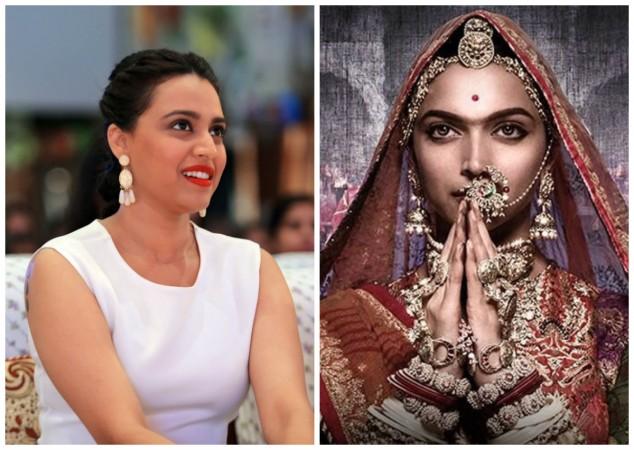
Padmaavat co-writers Siddharth-Garima have responded to Swara Bhaskar's open letter, in which she had said that she "felt like a vagina" after watching the magnum opus.
In an open letter, the actress had criticised director Sanjay Leela Bhansali alleging that he glorified the practices of jauhar and sati in his film Padmaavat. While Swara had received both appreciation and backlash for the comments, Siddharth-Garima have come up with a strong response through an open letter again.
Also read: Shahid Kapoor finds Swara Bhaskar's open letter on Padmaavat a 'bit disgusting': Read full reaction
The letter titled "An open letter to all Vaginas" started with the dictionary meaning of feminism, and then went on to sarcastically mention some of the "'true' & 'real' depiction of feminism in recent films".
Soon they targeted Swara and her "vagina" comment in the letter. They stressed that Padmavati's character is shown taking up jauhar by will and not by force. They also reiterated that the film is set at a mediaeval age, and hence it cannot be compared with today's era.
ALSO READ: Rani Mukerji walks out from Karan Johar's reality show, here's why
The two writers put forward some very logical counter to Swara's open letter, and then concluded it saying, "So people who feel like a 'vagina' after watching Padmaavat, should continue to feel like a 'vagina' for they would never understand the power it has. The power to create and run the world. Such people are the biggest road-blocks for 'feminism'."
Also read: Deepika Padukone's this statement is perfect reply to Swara Bhaskar's open letter
Below are some of the highlights from the open letter to Swara.
"Did they feel like a 'vagina' when Rani Padmaavati almost orders her husband, who obliges, to throw out the lecherous priest? She takes a decision, as a vagina. Did they feel like a 'vagina' when Rani Padmaavati decides to show her face to Khilji in a mirror? Though it was her decision, as a vagina. Did they feel like a 'vagina' when Rani Padmaavati goes to 'rescue' her husband who had been abducted? Again, a decision against the system, as a vagina. They must have felt like a 'vagina' when she chose 'fire' over 'rape'? It was her 'call', her 'decision' as a vagina. Right, wrong, strong, weak is up to you to interpret as a 'penis' or as a 'vagina'.
"Feminism is about taking a stand. Taking a decision and standing by it. About having the freedom to choose. It's a thought that gives you freedom to just be. Not become equals or equally chutiyatic (wait that's 'vaginal') as another gender.
"When you took your whole family and cook for the film, didn't you know it is going to end with a jauhar? Why act so surprised? Oh because you wanted him to include a comment on the practice? Ok then... as if the number of disclaimers were not enough. It's the story of womens' valour and their brave, harsh, radical decision. Their choice. That my dear is feminism. The power to be able to choose.
"Why make them small and guilty of an act that they chose to protect themselves in the face of lynching and a life of slavery? Why judge that day from 700 years ago with 'what would I do today'? It's a film based in the 13th century when women preferred and chose death to rape.
"It was Padmavati's choice and free will to not give herself up to Khilji. The question about life after rape does not arise. She, out of her free will, chose to embrace the fire rather than the tyrannical Alauddin. How is that any less empowering? It was a matter of choice and not forced upon them by their husbands! So, Padmavati was not a 'rape victim' who was so shamed that she didn't have a right to live, as you make it out to be in your letter. Amazing what you all make it into. Was your open letter about Padmaavat or the regressive 'Bhoomi'?
"So people who feel like a 'vagina' after watching Padmaavati, should continue to feel like a 'vagina' for they would never understand the power it has. The power to create and run the world. Such people are the biggest road-blocks for 'feminism'."
You can read the full open letter by Siddharth-Garima here.
While Swara's open letter has recieved both appreciation and backlash from the industry and commoners, several Bollywood filmmakers and actors feel that every filmmaker has their own unique style of telling a story.
Recently Ayushmann Khurranan also voiced his opinion about this controversy, to The Indian Express. He said while he hasn't read Swara's letter, he feels that no piece of art can be objective and as long as it is starting a debate, it is fine. "A movie does two jobs: either it gives something to the society or it takes from it. Every director has his or her own perspective. The intention of every piece of art is to cause a debate, a discussion, there are critics also who discuss and then the audience also gives its opinion. So, everyone has their own opinion. Art is always subjective, never objective."


!['Had denied Housefull franchise as they wanted me to wear a bikini': Tia Bajpai on turning down bold scripts [Exclusive] 'Had denied Housefull franchise as they wanted me to wear a bikini': Tia Bajpai on turning down bold scripts [Exclusive]](https://data1.ibtimes.co.in/en/full/806605/had-denied-housefull-franchise-they-wanted-me-wear-bikini-tia-bajpai-turning-down-bold.png?w=220&h=135&l=50&t=40)



!['Had denied Housefull franchise as they wanted me to wear a bikini': Tia Bajpai on turning down bold scripts [Exclusive]](https://data1.ibtimes.co.in/en/full/806605/had-denied-housefull-franchise-they-wanted-me-wear-bikini-tia-bajpai-turning-down-bold.png?w=220&h=135)


![Nayanthara and Dhanush ignore each other as they attend wedding amid feud over Nayanthara's Netflix documentary row [Watch]](https://data1.ibtimes.co.in/en/full/806599/nayanthara-dhanush-ignore-each-other-they-attend-wedding-amid-feud-over-nayantharas-netflix.jpg?w=220&h=135)